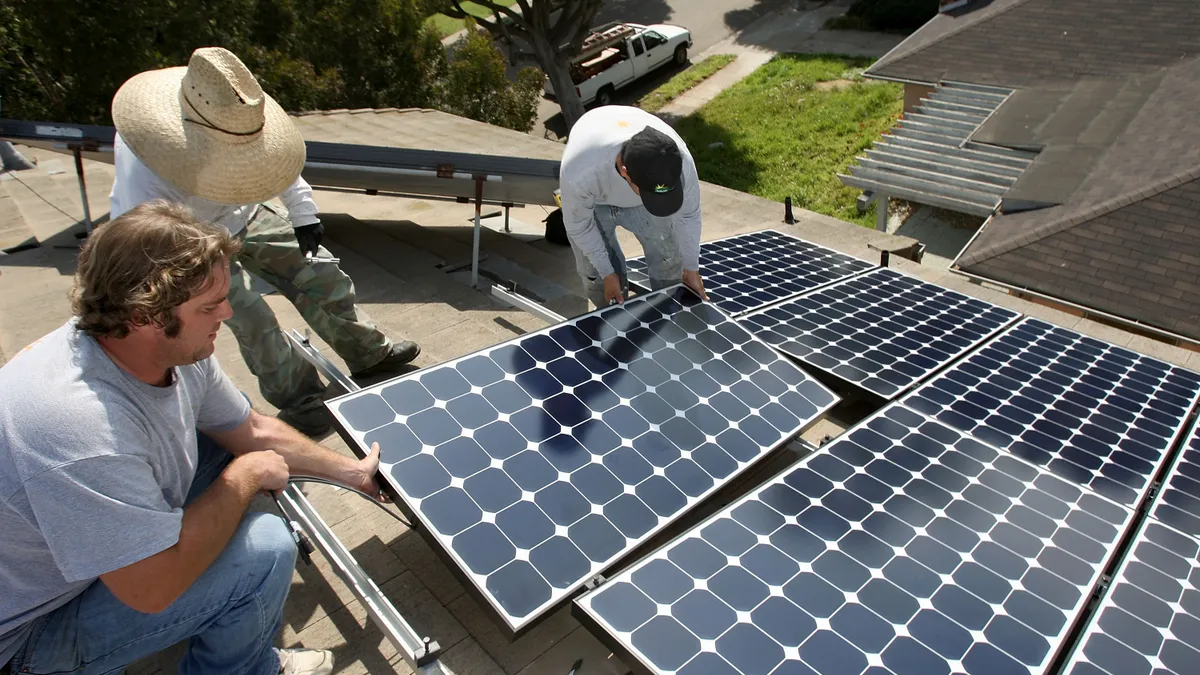Dive Brief:
- The Southern Environmental Law Center (SELC) and the Birmingham-based law firm Ragsdale filed a lawsuit in federal district court on Monday targeting the Alabama Public Service Commission's approval of monthly fixed charges for Alabama Power customers with distributed solar.
- The lawsuit, filed on behalf of nonprofit health advocacy group GASP and four Alabama Power customers with distributed solar, asks the court to block the monthly fees for private solar investments that have been in place since 2013. State regulators approved Alabama Power's proposed increase to the charge in October, from $5/kW to $5.41/kW.
- SELC's Alabama director Keith Johnston said this is the largest fixed charge on solar that the group has found. In Kansas, regulators had approved a $3/kW demand charge for Evergy distributed solar customers during colder months that increased to $9/kW during hotter months. But the Kansas Supreme Court found in April 2020 that it was an example of illegal price discrimination against customers with solar installations and ruled against it.
Dive Insight:
Distributed solar advocates are contuing to look to the courts for relief amid an expanding battle over demand charges.
"Alabama Power's discriminatory fees are likely the worst of any major utility, but they are not the only ones. From Massachusetts to Kansas and California, we're seeing discriminatory fees pop up in almost all markets," Sachu Constantine, managing director of the regulatory division at Vote Solar, said in an e-mail.
SELC had filed complaints with federal and state regulators regarding Alabama Power's monthly fee, prior to pursuing its lawsuit.
The Alabama PSC dismissed the complaint in October, and the Federal Energy Regulatory Commission issued a decision in June to not take enforcement action against the PSC, despite requests from the petitioners. "FERC’s decision not to act is consistent with its customary practice in response to such enforcement petitions," SELC wrote in a Tuesday press release.
FERC Chairman Richard Glick and Commissioner Allison Clements wrote in a joint concurrence statement expressing concern that the state regulators may have violated federal law by discouraging rooftop or customer-sited solar growth. "Petitioners have presented a strong case that the Alabama Commission failed to adhere to the regulations set forth in FERC Order No. 69, violating the requirements of [federal law]," they wrote in June.
Order 69 established FERC's implementation rules for the Public Utility Regulatory Policies Act of 1978, aimed to increase the production of power by small renewable generation projects.
"This issue was fully examined by the Alabama Public Service Commission, which included a lengthy public hearing, with the plaintiffs choosing not to pursue the case further in state court," Alabama Power said in April.
However, the FERC decision allowed SELC and Ragsdale to sue the PSC in the United States District Court for the Middle District of Alabama, in Montgomery.
Alabama Power rooftop solar customers number in the hundreds while fellow Southern Company subsidiary Georgia Power has thousands of distributed solar customers, SELC's Johnston said. As distributed solar interest grows in other states in the South, he called the current fees in place a "draconian disincentive for Alabama to implement rooftop solar."
"The thing is, local clean energy actually saves all customers money, including customers who do not have rooftop or community solar. So we support great organizations like SELC and GASP who, like us, are not going to let monopoly utilities stand between customers and solar freedom," Constantine said.
The June report from Environment America Research & Policy Center and U.S. PIRG Education Fund, Blocking Rooftop Solar, provided details of utility efforts to levy fixed charges on solar rooftop owners in order to prevent cost shifts to non-distributed energy customers, including the legal challenge of the Kansas Corporation Commission's approval of Evergy's charges.
"Fixed charges or fees are a major utility tactic to slow the growth of rooftop solar and utilities often justify these charges by arguing that they are necessary to maintain infrastructure. This is the same argument being used by Alabama Power in the case of these solar fees," Bronte Payne, Go Solar campaign director for Environment America, said.
Meanwhile, the utility behind the program has issued statements to dispel criticisms of the program.
"There is nothing about the lawsuit that changes our position – we believe the lawsuit is without merit. Customers who want to rely on the company to back up their own generation should pay their share of associated costs," Alabama Power spokesperson Alyson Tucker said.
The monthly fee in question was approved in 2012 by state regulators on top of other fixed and variable charges.
While the Alabama PSC refrained from commenting on the lawsuit and the Alabama Power program in question, a PSC spokesperson confirmed the commission does not have other dockets focused on distributed solar.
"Policymakers need to recognize and resist any attempts to undermine rooftop solar, and put in place strong policies to encourage its growth," Payne said.
That poses a difficult path forward when support for solar is lacking from policymakers. In the past two decades, Alabama state legislators have not directed the PSC to take any action on rooftop solar access or distributed solar resources, the PSC confirmed.















